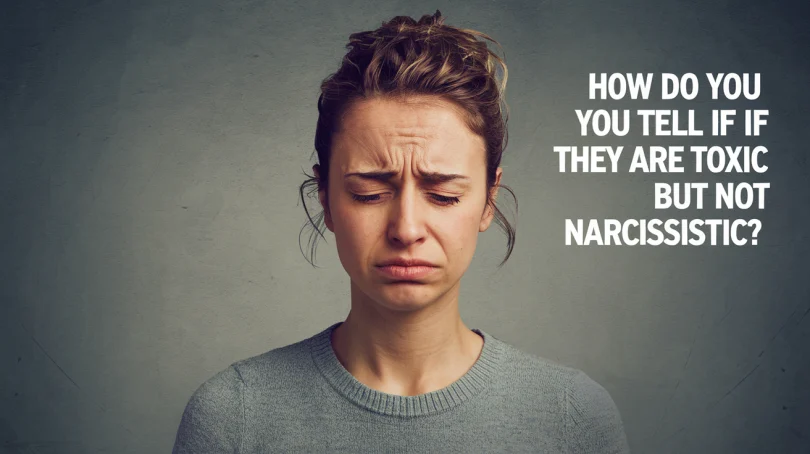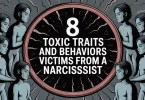What is healthy behavior, or healthy behavior in a relationship? I would say it is honesty, trustworthy behavior, self-reflectiveness, self-awareness, regulation of emotions in an appropriate manner, balance, respect, creating psychological safety, kindness, and compassion.” It’s behaviors that make the other person in the relationship feel like they can be themselves, that they’ll be accepted for all that they are.”
Imperfection and Accountability
It’s certainly not about perfection, and when mistakes happen, that there’s an owning of that, of awareness of the pain to another that this behavior caused. It’s about real apologies and behavior change.” Honour healthy relationships – meaning relationships based on being present, not only when you get what you want or need And this would mean what a healthy relationship is in all types of relationships: intimate relationships, friendships and family relationships. Healthy is healthy.
Related Topics:
8 Signs You’re in a Narcissistic Relationship
5 Weird Ways Toxic Family Members Punish a Truthteller for Going No Contact
7 Narcissistic Behaviours That Seem Normal but Are Actually Toxic
The Challenge for Narcissistic Individuals
Well, these healthy behaviors in any kind of consistent manner would be, uh, heavy lift or pretty darn near impossible for a narcissistic person. By definition, narcissistic relationships are one-sided; they exist to serve the narcissistic person’s needs, and generally, they do not feel psychologically safe.
The Gray Zone: Not Healthy, Not Narcissistic
But is there an in-between place? People who are not healthy in relationships or who don’t engage in healthy behavior but are not narcissistic? And obviously, the answer to that is, oh yes, obviously there is. And this group of people can be very confusing.
You may say, I know they’re not narcissistic; in fact, they’re often great, but conflict and tension brings up something messed up in them, or they do get worked up, but then they also apologize, or you find that it is difficult for them to admit that they are wrong or that they’re responsible for something, or they tend to come in hot and dysregulated. And while they will calm down with some time, it does mean you do need to do a bit of eggshell walking around them.
Situation-Specific Triggers
However, this can be very situation-specific. You may even know exactly what their triggers are. For example, if they feel that they are being left out, or they are caught in a lie, or arguments or conflict make them panicky, and they escalate fast, or they go silent when they don’t know how to manage a situation.
But when things are running smoothly, the relationship’s generally fine. Maybe this is a person who’s rough around the edges, but you would not say it doesn’t feel like it, and they wouldn’t say that they’re narcissistic.
Narcissism vs. Unhealthy Behavior
And this matters because narcissism is a personality style; it is a much more enveloping concept. It’s who the person is; it’s their personality. And it means that even when there is no trigger situation, and just to be dominant, or maybe the trigger situation is so vague and something that activated shame in them in a subtle way, they continue to gaslight and get in their little digs.
And while your not healthy but not narcissistic friend or partner or family member may not violate your trust or betray you betrayal is kind of a universal in narcissistic relationships when you are in a not healthy but not narcissistic relationship, you may even find yourself saying something like, oh, I love this person; it’s just that they lose it when they are not invited to something, even something boring. And that’s, and it’s not even like a fun thing to go to, and so I don’t ask them to come because I’m trying to save them the headache of feeling that they have to show up. But you don’t typically feel, though, unsafe or unseen around them.
Managing Intense Behaviors
Other things that may happen in an unhealthy but not narcissistic relationship are that you are managing what feel like intense sorts of problems in them, like little foibles. Maybe it can feel extra, but it’s not the same kind of unsafe, confusing, or crazy-making as the narcissistic relationship.
However, in this unhealthy person, you may find that it is not always easy to create and foster change in that, and they may continue to act out or behave badly even when you have talked about something with them.
Navigating the Gray Zone
This gray zone can be confusing, and this gray zone is also a reminder of why it is not necessary that everything needs to fit or meet the definition of narcissism for it to be unhealthy. You’re not healthy but not narcissistic, friend or partner, or family member; they may still be a real handful, and you know that this relationship can be tiring, even exhausting.
You may watch what you say around them, but you may also find yourself doing this to protect this other person, who this not healthy but not a narcissistic person who seems to lack a certain set of coping skills. And you don’t necessarily find yourself wondering what is wrong with you or blaming yourself for this healthy but not narcissistic person’s bad behavior. You may be pretty clear on what is happening and recognizing this is not a healthy relationship, but it is also not leaving you feeling confused, crazy, and upside down.
Beyond Dichotomies
When it comes to human beings, there are few perfect dichotomies. It’s not about healthy versus unhealthy, narcissistic versus non-narcissistic. It’s about ranges and continuums, and this becomes particularly important when we are thinking about that sort of crossover point of unhealthy and narcissistic.
When we are thinking about relationships, it’s not as simple as, this is an unhealthy relationship, so I must be in a relationship with someone narcissistic. It may be, but it also may be that this is an unhealthy relationship because of the patterns and the behaviors, and knowing that some of these behaviors and patterns may bother some people more or less than others. That’s why some people who are not healthy but not narcissistic actually might do fine with someone else who has a different backstory than you.
Learning from Unhealthy Patterns
We have never really been taught that some patterns in relationships are not healthy, especially if we grew up in an unhealthy family or observed unhealthy relationships. That’s half the battle. And unhealthy relational patterns don’t mean that we have to run screaming away right away. It may mean we need to pay attention, and the earlier we do that, the more discerning we can be and figure out sort of the most comfortable path forward, and also maintain realistic expectations for the limitations of the relationship.
Managing Non-Narcissistic Unhealthy Relationships
Now, of course, all bets are off if this is a narcissistic relationship, but in relationships that are simply not healthy but not narcissistic, you may have more options.
Many not-healthy but not-narcissistic relationships can be managed at some level for the long term. And there may be some internal eye-rolling or having to gird and strengthen yourself at times, and also some, a lot of empathy from your side, as well as attempts for this not always healthy person to try to make amends.
And their apologies might even feel genuine, and you might even see them trying to do a little better. And it may not always feel easy, but you may also not feel as though you’re being dismantled and broken down in the relationship.
Factors Contributing to Unhealthy but Non-Narcissistic Relationships
What are the things that can contribute to a relationship being unhealthy but not narcissistic? They are different things. Sometimes, people who may have unaddressed or post-traumatic stress or complex trauma, you might see some of these patterns come up.
Other personality styles could bring this up; other antagonistic personality styles, but then that’s going to feel more narcissistic. People who might have mild depression or even cycles of depression might have some of these experiences. You know, sometimes people who are in, who are living with addiction or maybe in the early stages of recovery from addiction, you might see some of these patterns.
Recognizing Non-Narcissistic Struggles
But what you also, like I said, the key is to remember you might, that you might also have that backstory, but above all else, what you’re not doing is engaging; you’re not confused, you’re not engaging in self-blame. And many times, in not healthy but not narcissistic people, you’re going to see that their not healthiness tends to persist across the situations, so they’re struggling with some of these dynamics at work, with other friends.
Like, it’s no secret; no one is surprised, like, God, this is a little bit of a struggle, but there’s also some shows of good faith. You will see an attempt to do it; there will be almost a sense of wholeness or a little bit of justice. You feel they, like, okay, they’re acknowledging this, like, I don’t feel crazy.
The Importance of Clarity
Once you lift that sense of not feeling crazy in a relationship, is odds are that it’s not narcissistic, again, but also may not be healthy. However, this idea that not all unhealthy relationships are narcissistic is a real misnomer, and it misses an opportunity for people to figure out how to navigate relationships in their life that they still value but also find challenging, without just sort of writing them off as these are narcissistic relationships. It’s all a lot more subtle than that. I hope this is helpful, and thanks again.







Leave a Comment